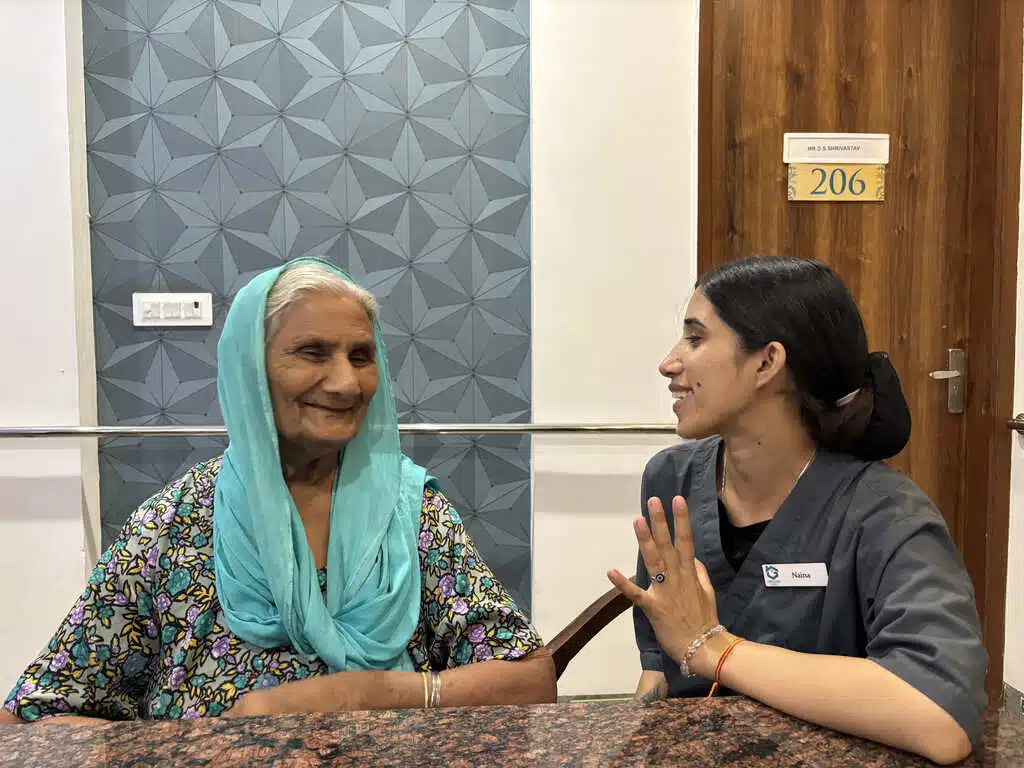
Decisions About Assisted Living
Ideal Age For Assisted Living
Move a Parent to Assisted Living
Personalized Care in Assisted Living
Assisted Living For Dementia Patients
What Is Assisted Living?

Assisted living is a compassionate residential care solution designed for older adults who need help with everyday tasks—such as bathing, dressing, mobility support, meal assistance, or medication management—but do not require the advanced medical supervision offered in a nursing home.
These communities provide the ideal balance between independence and personalized support, ensuring seniors can live with dignity, comfort, and safety. Residents enjoy private or semi-private living spaces, access to trained caregivers, nutritious meals, social engagement activities, and round-the-clock assistance whenever needed.
At its core, assisted living empowers seniors to maintain an active, meaningful lifestyle while having the reassurance that help is always close by—offering peace of mind to both residents and their families.
Top 10 Benefits of Assisted Living Services in India
As per the data, the age demographics of Seniors who move to Assisted Living are “81% of them are 75 years and above”.
It’s essential and very important to choose the right Assisted Living facility to provide personalized support and encouragement to seniors to overcome these challenges and adjust successfully to their new living arrangement in Assisted Living.
- Health Condition: Seniors with chronic illnesses or mobility issues may require more time to adapt to their new environment in the Assisted Living facility.
- Social Support: Having family or friends nearby can ease the transition, while those with limited social connections may take longer to adjust.
- Previous Living Situation: Moving from a private home to a care home setting in Assisted Living can be a significant change, particularly if the individual has lived independently for many years.
- Personal Resilience: Some seniors are naturally more adaptable and resilient than others, making the adjustment in the Assisted Living process smoother.
- Caregiving staff: The quality of care and support provided by Caregivers can greatly impact how quickly an elderly person adjusts to assisted living.
- Engagement in Activities: Participation in community activities for seniors and programs can help seniors feel more connected and engaged, facilitating a quicker adjustment.
- Emotional Preparedness: Seniors who have mentally prepared for the transition may find it easier to adjust compared to those who were reluctant or resistant to the idea of assisted living.
- Quality of Facilities: The physical environment and amenities available in the assisted living facility can influence comfort and overall satisfaction, affecting the adjustment period.
- Routine and Structure: Establishing a predictable daily routine can provide a sense of stability and familiarity, aiding in the adjustment process.
- Coping Strategies: Individuals who have developed effective coping strategies for managing stress and change may adapt more readily to their new living situation.
Assisted Living Facilities at Gracias Living
We provide seniors with the support they need, from health care to cultural activities, all in a setting that feels just like home.
Our team is always there to lend a hand with daily tasks, ensuring each resident feels safe and cared for.
We focus on helping them enjoy each day with comfort and respect. Choose Gracias Living for a caring, family-like environment that respects our Indian values

Our Services
Why your parents need Assisted living facilities
As parents grow older, everyday activities such as bathing, dressing, preparing meals, and remembering medications can slowly become challenging. Assisted living facilities provide the support they need while allowing them to maintain independence and dignity. With trained caregivers, 24/7 assistance, nutritious meals, and a safe living environment, seniors can avoid risks like falls, social isolation, or declining health.
Choosing assisted living ensures your parents receive consistent care, companionship, and a structured routine—helping them stay comfortable, confident, and emotionally fulfilled as they age
A Warm, Caring Assisted Living Community Services
With our compassionate caregivers and a deep focus on seniors’ well-being, your loved ones are always in trusted hands. Our residents enjoy a comfortable stay, nutritious meals, personalized care, and meaningful daily activities that keep them active and engaged.
From gentle exercise sessions and hobby-based activities to group celebrations and community events, we offer something for every personality and interest. Our team ensures each resident feels supported—not just physically, but emotionally as well.
We create a warm, friendly environment where seniors feel connected, respected, and truly valued. At Gracias Living, we believe aging should be joyful—and our community is designed to make every day safe, fulfilling, and full of companionship.
Assisted Living Pricing In India
Gracias Assisted Living offers transparent and personalized care plans for seniors, with pricing starting at INR 61,000 per month for twin-sharing rooms, INR 90,500 for single occupancy, and INR 1,22,000 for double occupancy for related seniors.
Services include 24/7 care, meals, nursing support, medication management, daily activities, and housekeeping. A refundable deposit of INR 3,00,000 and a petty cash reserve of INR 25,000 are required.
Care levels range from fundamental to extensive, with personalized fees determined after medical assessments. Additional services like physiotherapy, personal caregivers, and laundry are chargeable.
Long-term stays require an 11-month contract, while short-term stays are available for a minimum of one month. For inquiries, call +918700484949.
Assisted Living with Elder Care
Engagement Activities
Independent Vs Assisted Living
Nursing Home Vs Assisted Living
Growth of Assisted Living In India
Choosing care for a loved one is a big step. At Gracias Living, we ensure everyone feels like family, providing a place filled with kindness, care, and community. Visit us to see the difference we make in the lives of our beloved seniors
Contact Us Today!
Our Team Will Contact You Shortly.
Frequently Asked Questions
Question 1: What is Assisted living, and how does it differ from nursing care?
Ans: Assisted living supports daily activities, such as dressing, grooming, medication reminders, and meal services, with a strong emphasis on maintaining independence and dignity. Nursing care, however, is more medical-focused, with nurses or medical professionals offering 24/7 clinical care.
Question 2: What services does Gracias Living provide for seniors?
Ans: Gracias Living offers services that include assistance with daily activities, housekeeping, 24-hour security, wellness programs, personalized meal plans, on-site medical support, and various recreational activities.
Question 3: How does Gracias Living support residents with Alzheimer’s or dementia?
Ans: Gracias Living has specialized memory care services. Our caregivers are trained in Alzheimer’s and dementia care, focusing on providing a secure and calming environment with therapeutic activities that promote cognitive function and emotional well-being.
Question 4: What is the process for moving in?
Ans: The process begins with a consultation, during which we assess the needs of the potential resident. Once we determine the right care level, our team guides you through admission, room selection, and move-in coordination.
Question 5: Are there medical facilities available on-site?
Ans: Yes, Gracias Living provides on-site medical support, including regular health check-ups, emergency care, and access to physicians and allied health professionals.
Question 6: How do you ensure the safety and security of residents?
Ans: Gracias Living ensures resident safety with 24/7 security personnel, CCTV monitoring, emergency alert systems, and fall prevention measures. All staff are trained in emergency response protocols.
Question 7: What activities are available to keep residents engaged?
Ans: We offer a variety of activities designed to keep residents mentally, socially, and physically active. These include yoga, art classes, book clubs, and movie nights, along with interactive games and cultural celebrations.
Question 8: Can family members visit anytime?
Ans: Family members are encouraged to visit and are welcomed warmly. We have flexible visiting hours, though we request families to respect quiet times and maintain the serene environment of Gracias Living.
Question 9: How Much Does Assisted Living at Gracias Living Cost?
Ans: Our pricing is transparent and designed to accommodate different needs and budgets. Costs vary depending on the level of care, type of accommodation, and any additional services chosen. For Details visit pricing page.
Question 10: What makes Gracias Living different from other assisted living facilities?
Ans: Gracias Living is the most loved Assisted Living facility among seniors and their family members. Our commitment to quality care, personalized attention, and a compassionate environment for the residents, and we aim towards the highest standards of safety. Our team is dedicated to creating a supportive, loving family-like atmosphere where residents can live comfortably, independently, and with dignity.
Gracias Living: Building Senior Living with Love, Heart, and Purpose Bigger Than Self.






